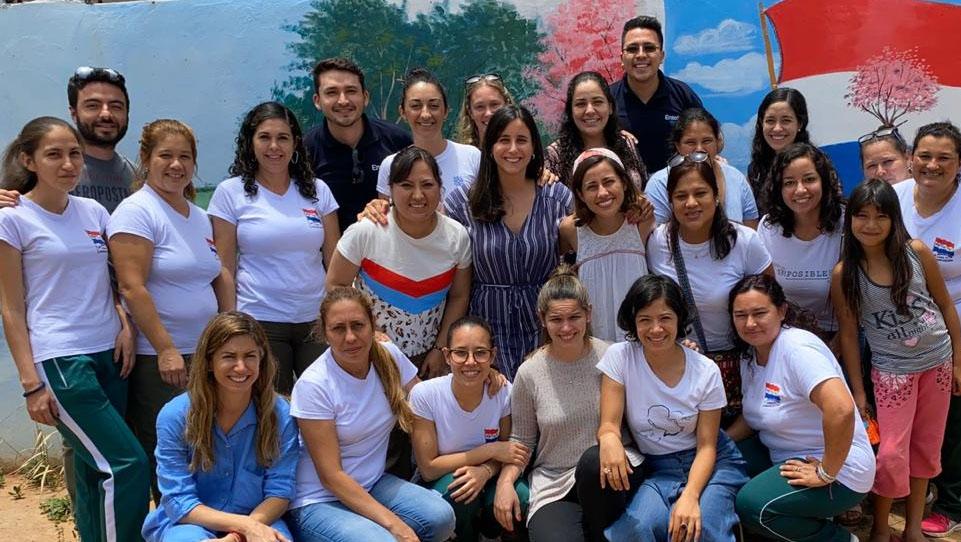Learning Across Borders About Authentically Engaging With Communities

Last month, Teach For All brought together staff members of network partners in Latin America who were interested in learning about engaging with the communities where they work in a meaningful way to inform the way they operate. Co-hosted by Enseña por Paraguay, the event offered the participants the opportunity to interact with diverse members of the communities where Enseña por Paraguay participants teach to gain an understanding of their context and their vision for their children. Attendees also learned how Enseña por Paraguay has actively shaped their current and future efforts by ensuring that communities they work with are at the center of all that they do. Enseña por Colombia's Head of Training, Ana Medina, and Head of Recruitment, Selection & Matriculation, Andrés Wilches, shared the following reflection on the experience:
Mba’eichapa (Hello, how are you? in Guarani, one of the official languages of Paraguay)
In December, we travelled to Paraguay along with five other representatives from four Teach For All network partners—Enseña Uruguay, Enseña Perú, Enseña Ecuador, and Enseña por México—to learn about the tools Enseña por Paraguay is using to engage with the communities they work with. These tools sparked a lot of ideas for all of us, and we left with concrete plans we could implement to learn more about the communities where we work to ensure that the vision of these communities is integrated into the everyday work of our organizations.
During our visit we had the opportunity to interact with parents, children, and teenagers from the community; teachers and school leaders; members of the public sector; allied organizations; community groups; and the Enseña por Paraguay staff. Together, we took part in activities such as social cartography (collectively mapping the social geography of a community), discussions, exhibitions, treasure hunts, and more. These spaces helped us realize how important it is to spend quality time with the people who live in the places where we work, because those interactions are often where we can find the answers to the questions we sometimes ask ourselves in our offices.
Aguyje (Thank you)
Among the first words we learned in Paraquay was the word for “thank you”—aguyje. This word and a feeling of gratitude were pervasive throughout our time there, and I want to say aguyje for enabling us, through these days together, to identify the following common challenges:
- The need to build genuine relationships with the people and organizations we work with
- The urgent need to hold the communities where we work at the center of everything we do
- The tension between efficiency and the time it takes to build networks and trust
- The ongoing transformation of our organizations due to internal and external factors
Aguyje for the opportunity to meet in this small part of Latin America and realize once again the similarities between our contexts, histories, and dreams. To walk the streets of Remansito felt like a deja vú of the streets of our communities in Colombia, Ecuador, Mexico, Uruguay, and Peru. To listen to local families talk about their values was to hear the voices of our ancestors or our students. To learn from a partner like Enseña por Paraguay in a country that felt like home gave us confidence in what’s possible to build with our own local communities.
Aguyje Enseña por Paraguay for being so open and vulnerable about your process.
Omba’apó Kua’a (Work hard)
To those of us who attended the learning trip, omba’apó kua’a is the definition of Enseña por Paraguay’s work—their commitment to working with their communities is evident and has motivated changes across the organization. In recruitment, it means identifying people who know Guarani, and also working with the community to create a method of assessing skills and mindsets from scratch based on the community’s definitions. In training, it means facilitating spaces for co-design where Enseña por Paraguay learns as much as they teach while they train alongside other stakeholders. In fundraising, it means collaborating with allies to develop proposals that aim to build genuine relationships with donors.
We ended our time in Paraguay considering what we want to do in our countries, inspired by what we learned and experienced during our visit.
Along with our colleagues in Colombia, we hope to:
- Hold planning sessions throughout the year with the stakeholders who are at the center of our work
- Make sure students are the driving force behind every action we undertake
- Design weekly challenges to test our perspectives about our own communities
Omba’apó Kua’a is for sure what we do in our organizations across the Teach For All network, but Enseña por Paraguay has shown us through their own example how this work can be designed with communities as the priority. What a privilege!



